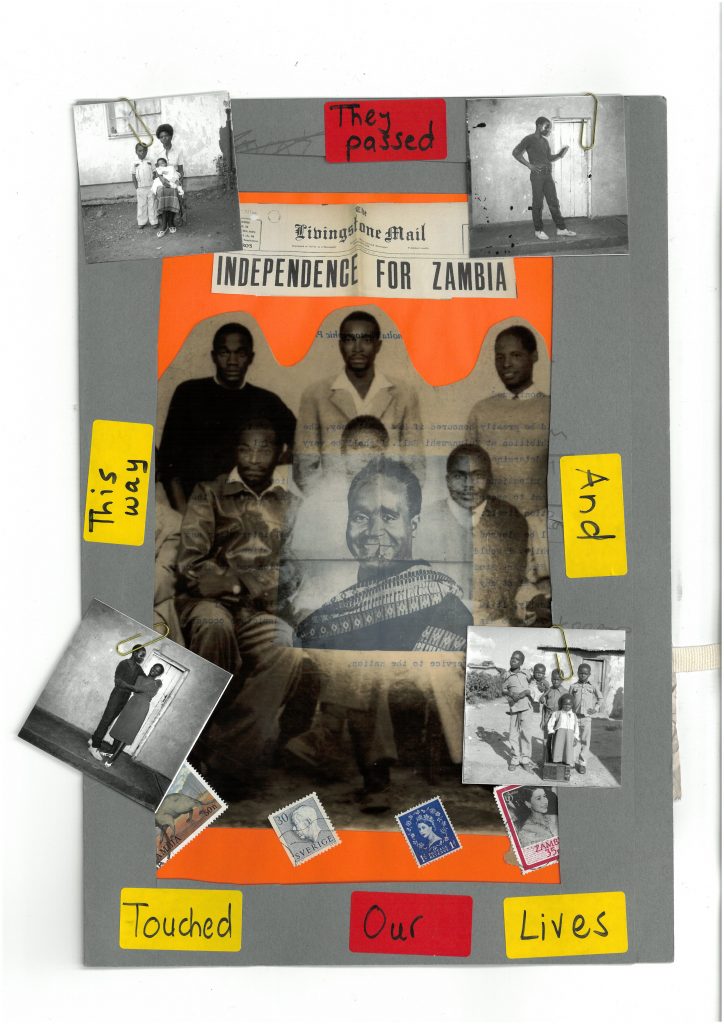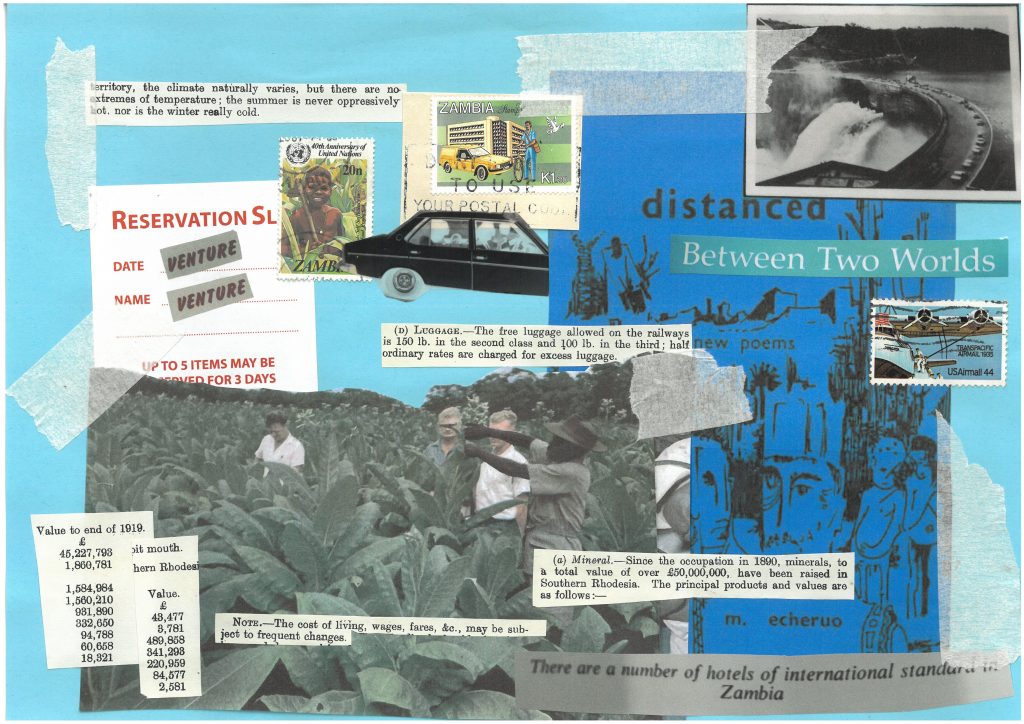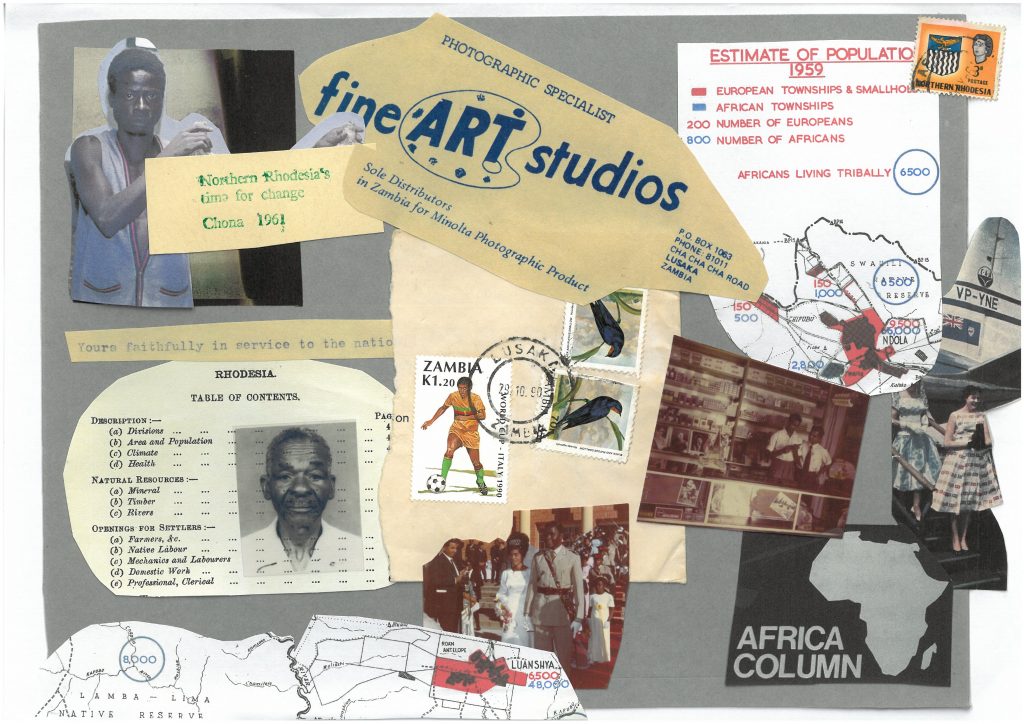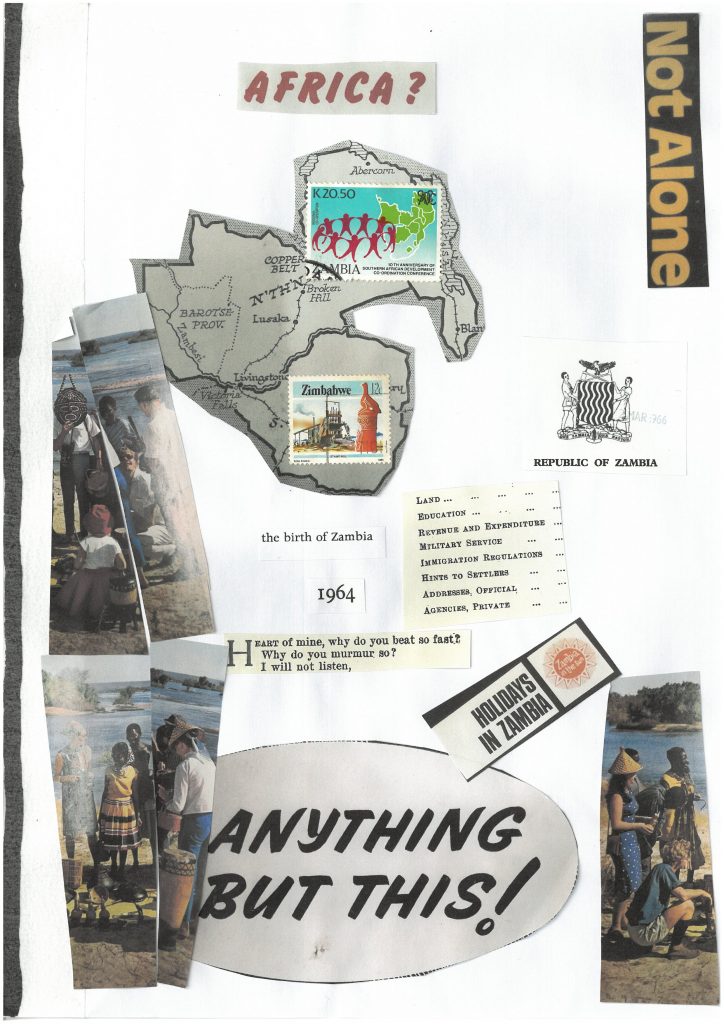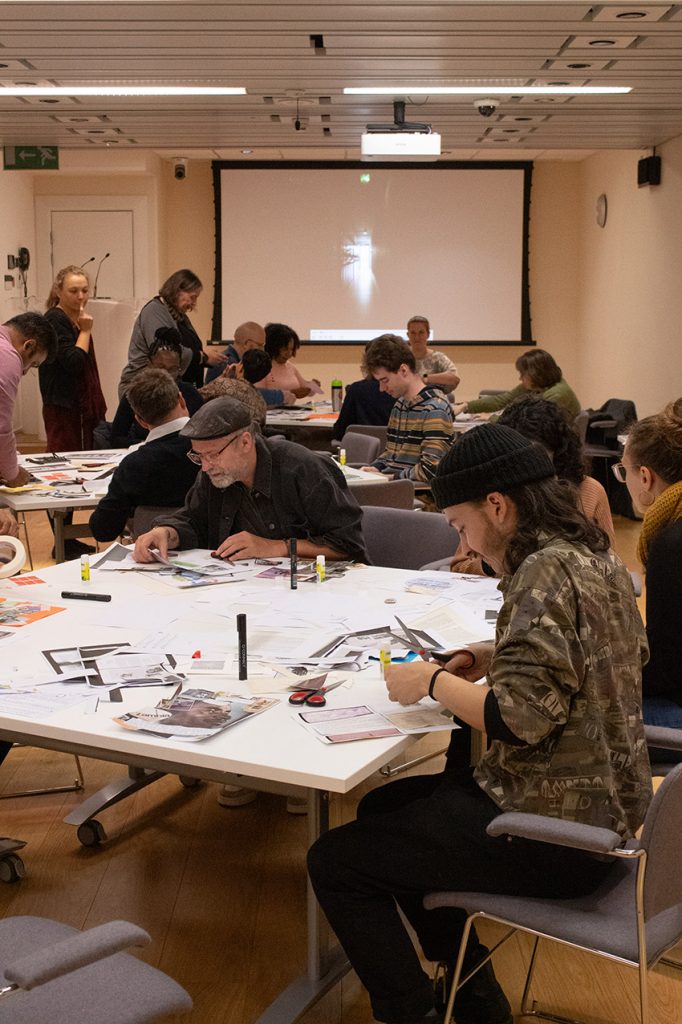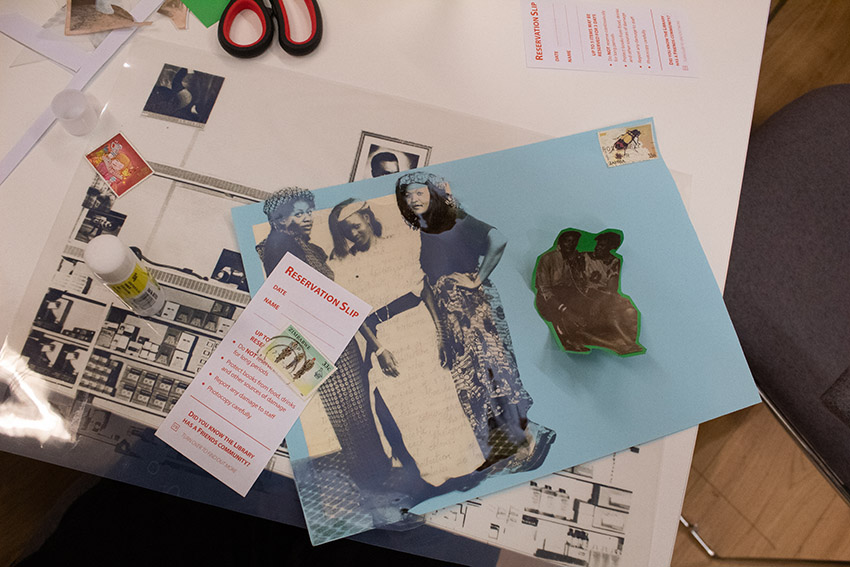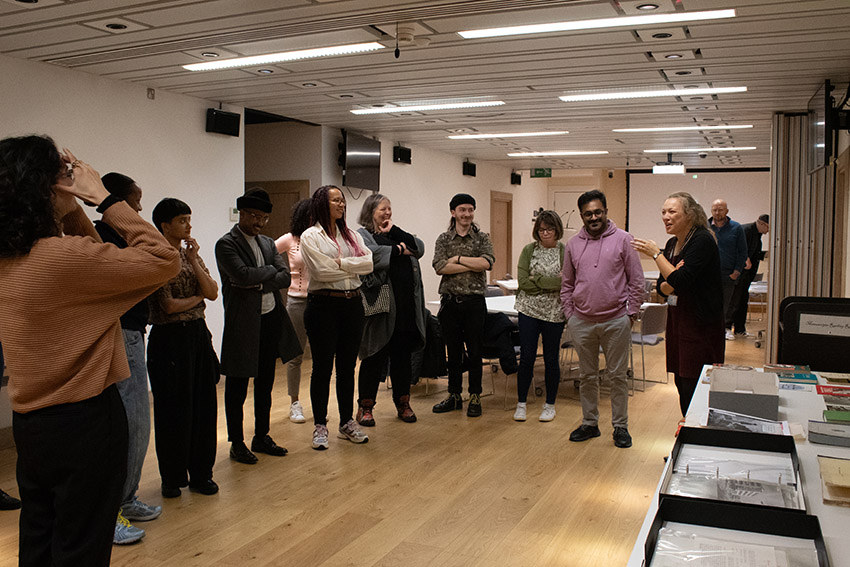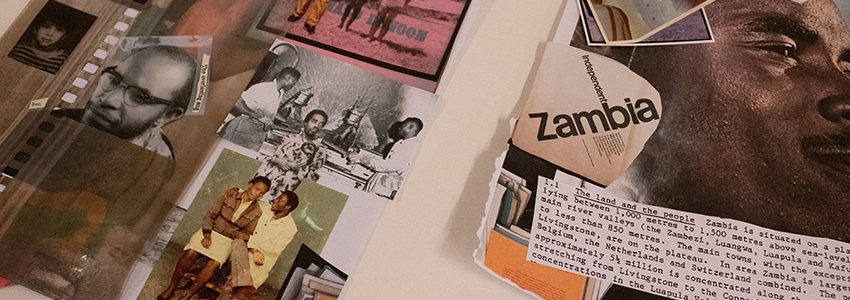
Cutting up the archive: reflections on the CVC fellowship
In October 2023, CVC fellows Kerstin Hacker and Sana Ginwalla ran a workshop at Cambridge University Library (CUL) entitled ‘Putting our resources to work: transforming archives through creative strategies’. The workshop was the culmination of their fellowship to investigate, provoke and intervene in the Royal Commonwealth Society (RCS) collection held at CUL, with a particular focus on material relating to Zambia. Sana has previously written of their experience working in the closed stacks of the RCS collection (‘Transtemporal at the University Library’, May 2023). The fellowship sought to explore how visual material relating to Zambia in the RCS collection could and should be considered, challenged and (re)used alongside the Zambia Belonging collection, a contemporary counter-archive established by Sana and built around unclaimed material found in the attic of the Fine Arts Studio on Chachacha Road in Lusaka.
The workshop was an opportunity for Kerstin and Sana to share their methods of creative intervention and to present new ways of engaging with archival collections, particularly problematic colonial-era collections. The event was attended by a broad mix of students, cultural heritage professionals, academics and photographers, representing both Cambridge and Anglia Ruskin universities. Alongside a short film and a display of original material, Kerstin and Sana invited the workshop participants to critically and creatively respond to the two collections, be that through cutting, pasting, folding, collaging, manipulating or creating something anew. The participants had access to a vast array of stationery, archival packaging material, old postage stamps and surrogate copies of visual and print material from the RCS and Zambia Belonging collections as well as a strictly enforced time limit.
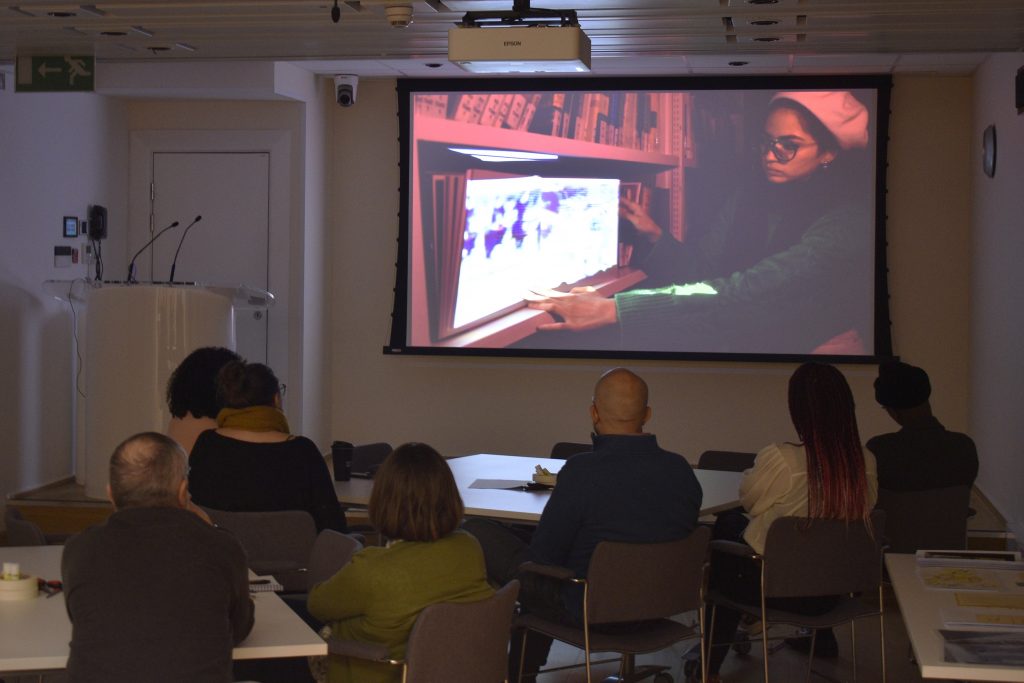
Two participants reflect on the workshop:
Amélie Deblauwe, Chief Photographic Technician, Cultural Heritage Imaging Laboratory (CHIL), Cambridge University Library
On the 13th October 2023 I attended the workshop ‘Putting Our Resources to Work: Transforming Archives through Creative Strategies’, organised by Cambridge Visual Culture and presented by the CVC fellows Sana Ginwalla and Kerstin Hacker. Through the case study of material related to Zambia held in Cambridge University Library for the Royal Commonwealth Society, the workshop highlighted the need for a re-thinking of the nature and the accessibility of colonial archives. The session consisted of the presentation of the short film ‘An Exhibition That Nobody Will See’, and a mixture of discussion and craft interventions on facsimiles of material. As participants, we handled, altered, juxtaposed, wrote over, or even cut out replicas of collection items. The playful aspect of the work allowed us to create new meanings and new forms for the archive while drawing our attention to its physicality and content but also to what was missing from it. The groups’ output was surprising, incredibly thought-provoking, and remarkably invigorating. The collages, pamphlets, pseudo-archival records, and other unique designs it generated shed a distinctive light on the collection, the room for creativity going some way towards countering the negative emotions which can arise from interacting with colonial archives. A final debriefing segment prompted a discussion too vast to be fully exhausted within the allotted time.
As a member of library staff with a background in humanities and photography, I thoroughly enjoyed the workshop. The format was extremely engaging and taught us an impressive amount of information about Zambia, a topic unfamiliar to most of us, within a very short time. It also prompted me to consider new and unusual ways of interacting with library collections. These are often kept behind closed doors thousands of miles away from their place of origin. The accessibility but also the curation and the meaning of these collections need to be re-defined, and the workshop provided the attendants and the CVC fellows with an opportunity to explore what those new definitions might be. Should it be organised, I would love to attend a follow-up session to further this reflection and to learn about the outcome of Sana and Kerstin’s fellowship.
***
Dr Siyabonga Njica, Smuts Research Fellow in African Studies, University of Cambridge
The CVC Workshop represented a commendable effort by the Cambridge University Library and CVC Fellows to make visible a selection of little-known and under researched Royal Commonwealth Society collections, whilst introducing to the Cambridge community the instructive counter-archive and decolonial registers of the Lusaka-based initiative Zambia Belonging. The format of the workshop – proceeding as it did from introductions, a film screening, collage-making, and reflections towards the end – not only created a stimulating and creative environment for us participants to explore key themes of the project, but enabled interactions regarding Zambian history and culture to surface in a candidly non-academic and organic way. The screening of An Exhibition That Nobody Will See went a long way in introducing us to the amazing collaborative effort between all those involved with the project. Most importantly, it also crucially animated the impressive conceptual schema developed by the CVC Fellows, whilst still affording the viewer unfettered access to the ‘behind-the-scenes’ processes which are at the heart of the project’s tenor and critique.
It was an eye-opening experience to witness the varied ways workshop participants responded to the CVC Fellows’ prompts and made unique use of the generously supplied stationary. Before I got to establishing an idea for my first collage, I was initially uncomfortable with the instruction to cut, scribble over, or modify the copied archival samples, notwithstanding my knowledge that these were not original documents. Once I got over my fears, I was struck by the enormous interpretative potential each piece of stationary, text extract, photograph etc. could bring when juxtaposed with other material in the workshop. In the end, through the use of photographs from Zambia Belonging, newspaper clippings from the Royal Commonwealth Society collection, postage stamps and black markers, amongst others, I created three pieces of collage titled Who’s Watching, They Passed This Way and Touched Our Lives, and The Quiet Violence of Dreams. The last two titles were a literary nod and homage to two eponymous works by the late South African anti-apartheid poet Don Mattera and the late South African post-apartheid novelist Kabelo Sello Duiker respectively. I also had the opportunity to modify/add to other participants’ collages, a welcome exercise which, considered together with my own collage interventions, taught me so much more about Zambian history which I had hitherto not known.
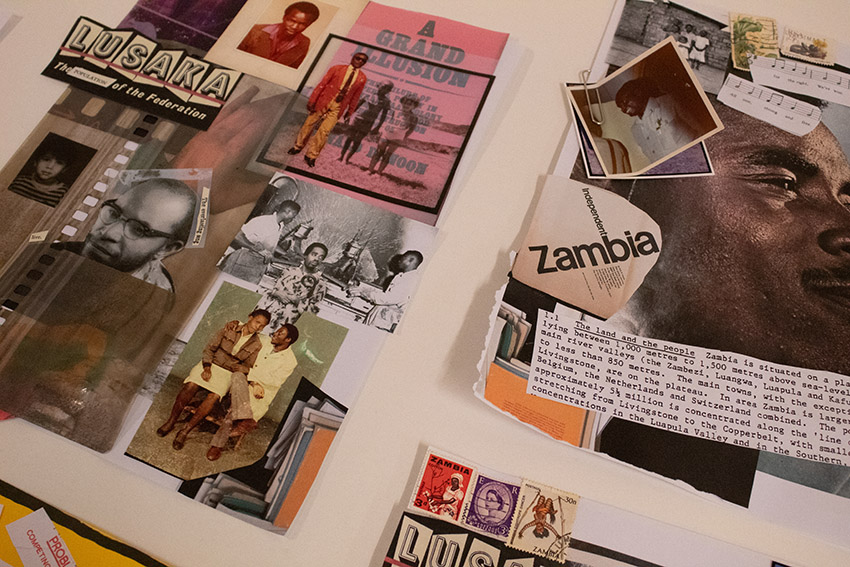
If the CVC Fellows’ provocation was for us to imagine an archive which was not coloured by colonialism and oppression, then it is fair to say that our collective and collaborative response by way of insightful, speculative, and creative counter-archive collages met this challenge in a resoundingly informative way. The opportunity we were all afforded towards the end to select and present pieces that we had touched, altered, or worked on was especially illuminating. Overall, the CVC Workshop and collaboration behind An Exhibition that Nobody Will See is another timely reminder of the collective potential (for mutually beneficial creative and discursive interventions) that can be harnessed, celebrated, and enjoyed when archivists, researchers, curators, activists, and the public join forces together.
***
The final group discussion was an undoubted highlight of the workshop. Ideas of ownership and possession were raised along with questions and musings on what belongs in an archive, who decides, what survives and what is lost.
Kerstin Hacker reflected, ‘The “Putting our resources to work: transforming archives through creative strategies” workshop allowed Sana and I to share some of the research we were able to conduct in the stacks during our CVC Fellowship. Being able to disseminate our creative and experimental methodology with the participants in the workshop confirmed to us that there is a desire to find novel ways of engaging with colonial archival material held in the UL. The outcomes and narratives created throughout the workshop show the transformative opportunities that lie within problematic archival materials, especially if we allow for the material to be in dialogue with broader audiences and other archival material like the Zambia Belonging archive.’
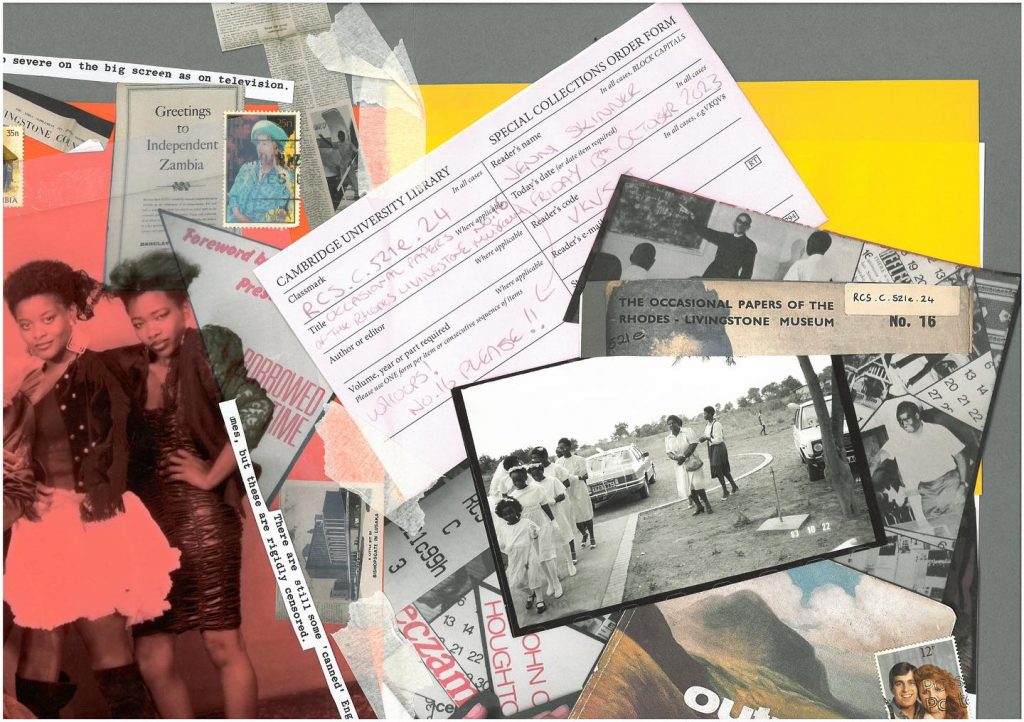
Re-entangling the visual archive
We are thrilled to continue collaborating with Kerstin and Sana. In summer 2024, CUL and the Centre of African Studies Library will welcome Kerstin, Sana, and two Zambian-based artists as core participants in a new project ‘Re-entangling the visual archive’ funded through the University of Cambridge’s Collections-Connections-Communities (CCC) Strategic Research Initiative. Watch this space for further updates.
A small selection of outputs from the workshop:
